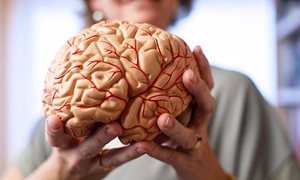
An advanced smartwatch can help provide reliable insight into how people with Parkinson's disease function at home. The study, published in npj Digital Medicine, was conducted by Radboud university medical center in Nijmegen, the Netherlands, in collaboration with Verily, an Alphabet precision health company. This first publication on the use of the Verily Study Watch in this research effort shows that patients are motivated to wear the watch daily for prolonged periods of time, and to regularly perform specially designed tests at home that objectively map important symptoms. The results show that for many patients, measurements at home reveal a different picture than measurements in the clinic. This finding can have a significant impact on science and healthcare, as smartwatches offer an alternative to the traditional clinical visit, allowing for more frequent and reliable assessments of a person's functioning in their own home.
In 2016, Radboudumc and Verily started the Personalized Parkinson Project, a prospective study of over 500 patients with Parkinson's disease. One of the goals of the initiative was to develop new methods that can accurately map the severity of Parkinson's disease. This is more important than ever, as new treatments for Parkinson’s are being developed, whose effects need to be measured objectively. Until now, this has been done almost exclusively on the basis of a hospital-based assessment by a clinician. However, such assessments are unreliable, for several reasons.
‘We have known for more than 200 years that it is not possible to reliably assess the severity of Parkinson's disease during an assessment in a clinical setting. A clinic visit is often experienced as a stressful event. Parkinson's is a disease where this stress produces strange and disturbing effects: some symptoms such as tremor get worse, but others can improve significantly, such as walking. In-clinic assessments are therefore highly biased and do not accurately reflect what is happening at home. Such assessments are also labor intensive: patients have to travel all the way to the hospital or clinic, and it requires considerable time from doctors and scientists. For this reason, these traditional assessments can only be performed occasionally, thus offering at best a snapshot perspective. Finally, clinical assessments are subjective and depend on the doctor's interpretation. It would be much better to measure patients much more frequently, in an objective manner, and in their own living environment,' says Bas Bloem, Professor of Neurology at Radboud university medical center.
All participants in the study wore the Verily Study Watch, a smartwatch designed for research purposes, every day for a duration of 2 to 3 years. The researchers, including first author Max Burq, Ph.D., a data scientist at Verily, report high motivation among study participants. 'Even after years of use, people wear the watch an average of 22 hours a day, so we can get a very complete picture of how the disease manifests at home,' says Burq. 'Using the motion sensors, we can map out important Parkinson's symptoms such as changes in gait and tremor. With the Study Watch’s other sensors, in the future we can study less well-known - but also important - non-motor symptoms. These include sleep problems, changes in heart rate, or the effects of stress.’
Although previous studies have looked at the added value of a smartwatch, this study from the Personalized Parkinson Project has some unique new elements. First of all, it is the largest Parkinson's wearable sensor study in the world, and people are being followed for much longer than ever before. But importantly, this study data collected in two ways: continuously in the background, and and through a series of tests that participants engaged in at specific times using the watch, for example stretching and resting the arms to measure shaking, walking for a while to measure arm swing, standing up from a chair to measure balance, and turning their hands to access slowness of movement. Says professor Bloem: 'The advantage is that you can carry out a remote neurological examination, as it were, while knowing exactly which movements the participant is making.. This 'Virtual Motor Exam,' made possible by the purpose-designed firmware integral to the Verily Study Watch, was also faithfully performed by most participants, even after more than a year. Burq notes, 'we seem to have been able to successfully engage the patients by closely involving them in the study and by offering them personal guidance.'
The results of the study show that the watch can reliably measure study participants’ core symptoms of Parkinson's disease in the home setting. In addition, it was possible to measure the effects of Parkinson's medication remotely. But the most notable finding was that for many participants the measurements at home gave a different picture than the measurements in the clinic. Burq emphasizes, 'All participants had also conducted the Virtual Motor Exam in the clinic. The results of that one measurement often differed from the weekly measurements in their home situation. We are convinced that the results in the home setting give a much more complete and accurate picture of the severity of Parkinson's disease.’
The next step is to see if the smart watch can be used to measure disease progression over time. 'The current results are an important step towards new digital measures for Parkinson's, and this could have great significance for future scientific research in this field. We now have an instrument that should be used in the near future as the new objective outcome measure in scientific studies. This will allow us to better assess the effect of new, disease-modifying therapies, over a longer period of time, in an objective manner, and in people's homes,' says Bloem.
About the publication in NPJ Digital Medicine
Virtual exam for Parkinson's disease enables frequent and reliable remote measurements of motor function - Maximilien Burq, Erin Rainaldi, King Chung Ho, Chen Chen, Bastiaan R. Bloem, Luc J. W. Evers, Rick C. Helmich, Lance Myers, William Marks and Ritu Kapur. DOI: 10.1038/s41746-022-00607-8.
-
Want to know more about these subjects? Click on the buttons below for more news.
More information
Pauline Dekhuijzen

wetenschaps- en persvoorlichter
Related news items

NWO Stevin Prize for expert on Parkinson’s disease Bas Bloem Major scientific prize for societal impact on research into Parkinson's disease
17 June 2022 Neurologist Bas Bloem of Radboudumc receives this year’s Stevin Prize of the Dutch Research Council (NWO). The Stevin Award is the highest distinction in science for a researcher in the Netherlands who has achieved particular success in the area of knowledge utilization for society. go to page
Aerobe exercise has a positive effect on brain function in Parkinson's disease patients
18 January 2022 Radboudumc researchers have shown that the brain function of patients with Parkinson's disease improved with regular exercise, which seems to strengthen the connections between different brain areas, while inhibiting brain shrinkage. go to page
Tiny blood vessels, big problems Radboudumc receives grant for international collaboration
3 November 2021 The Radboudumc, together with the University of Cambridge, receives a grant of €1.8M from three collaborating cardiac foundations for international research into the small blood vessels in the brain. This study will be led by Neurologist Frank-Erik de Leeuw and internist Niels Riksen. go to page
